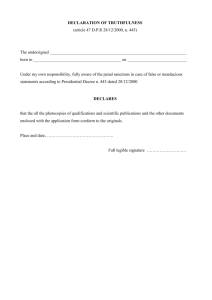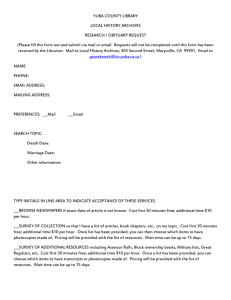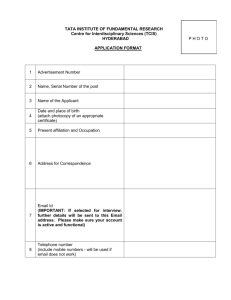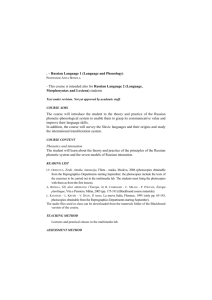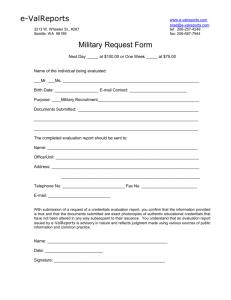PL 522 – THE PROBLEM OF TIME Spring 2010
advertisement
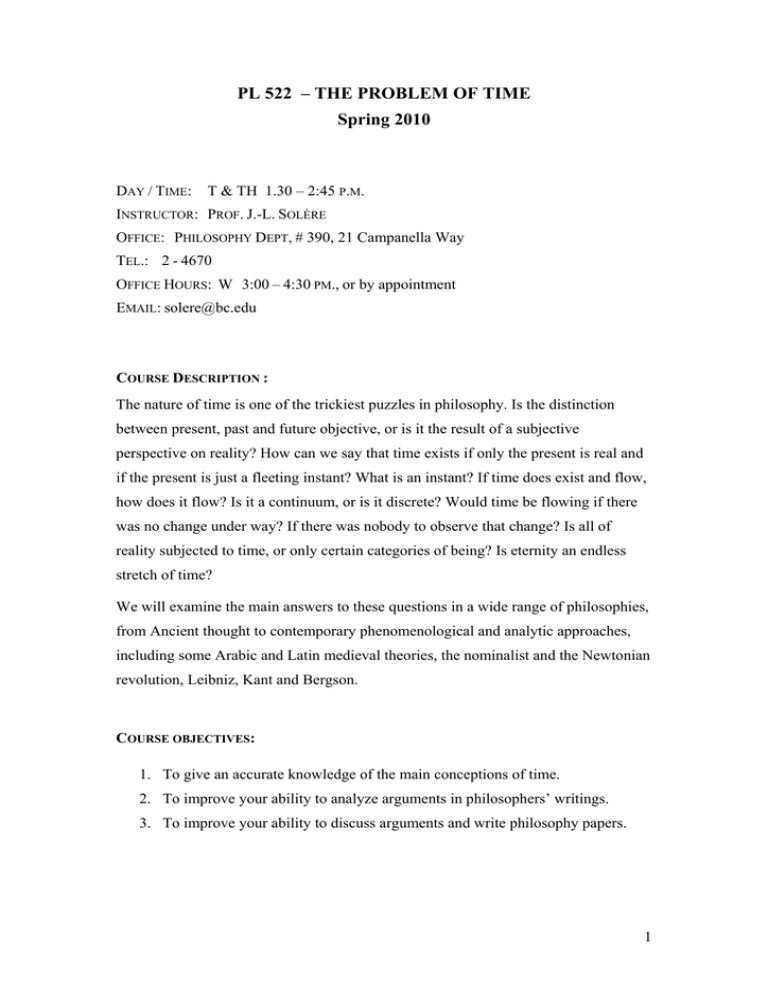
PL 522 – THE PROBLEM OF TIME Spring 2010 DAY / TIME: T & TH 1.30 – 2:45 P.M. INSTRUCTOR: PROF. J.-L. SOLÈRE OFFICE: PHILOSOPHY DEPT, # 390, 21 Campanella Way TEL.: 2 - 4670 OFFICE HOURS: W 3:00 – 4:30 PM., or by appointment EMAIL: solere@bc.edu COURSE DESCRIPTION : The nature of time is one of the trickiest puzzles in philosophy. Is the distinction between present, past and future objective, or is it the result of a subjective perspective on reality? How can we say that time exists if only the present is real and if the present is just a fleeting instant? What is an instant? If time does exist and flow, how does it flow? Is it a continuum, or is it discrete? Would time be flowing if there was no change under way? If there was nobody to observe that change? Is all of reality subjected to time, or only certain categories of being? Is eternity an endless stretch of time? We will examine the main answers to these questions in a wide range of philosophies, from Ancient thought to contemporary phenomenological and analytic approaches, including some Arabic and Latin medieval theories, the nominalist and the Newtonian revolution, Leibniz, Kant and Bergson. COURSE OBJECTIVES: 1. To give an accurate knowledge of the main conceptions of time. 2. To improve your ability to analyze arguments in philosophers’ writings. 3. To improve your ability to discuss arguments and write philosophy papers. 1 READINGS : Required sourcebook : Time, J. Westphal & C. Levenson (ed.), Indianapolis, Hackett (coll. “Readings in Philosophy”), 1993. Photocopies will be provided for other texts. This course has a Blackboard Vista site. You will find on it other documents and information, notably possible syllabus updates, a bibliography and recommended secondary readings. When, anyway, you feel you need introductory information about some not-so-wellknown authors we will study, help can be found in the Routledge Encyclopedia of Philosophy, the Stanford Encyclopedia of Philosophy or the Internet Encyclopedia of Philosophy. CREDITS REQUIREMENTS – Two take-home synthesis assignments (after classes 8 and 21): 20% each – One final exam: 20% – One research paper: 40% – Class participation: bonus points added to the writings average (5 pts maximum) Scale: D- 60-63 D 64-67 D+ 68-69 C- 70-73 C 74-76 B- 80-83 B 84-87 B+ 88-90 A- 91-95 * A 96-100 * C+ 77-79 * “I urge you to … use these top grades only for truly outstanding work” (A&S Dean to the Faculty). Readings assigned in the syllabus should be studied in advance, so as to make the best out of each class. You are expected to come in class: – with a synopsis of the positions defended by the author and the arguments that support them; –with questions about the parts of the reading you might have not understood and/or with discussion questions. Each student may email me synopsis and questions before 12:00 p.m. on class day. This will count for class participation. You may also form groups (not more than three persons), provided that you meet face-to-face for discussion; one person should then send the email for the group with names of all members in the email. 2 SCHEDULE WL means J. Westphal’s and C. Levenson’s anthology, Time. SEP means “Stanford Encyclopedia of Philosophy” (online) INTRODUCTION Jan. 19 – Class 1 > Introduction Jan. 21 – Class 2 > The foundation of the classical view: Aristotle 1, “the number of motion” (WL p.60-72). – Add.: Annas, “Aristotle, number and time” (photocopy). CHANGE AND CONSCIOUSNESS Jan. 26 – Class 3 > Time and soul: St. Augustine 1 (WL p.15-28); Husserl (WL p.3236); Mundle, “Augustine’s error” (photocopies) Jan. 28 – Class 4 > Time and creation: St. Augustine 2 (photocopies + WL p.6-15). Feb. 2 – Class 5 > The subjective flow: Merleau-Ponty: (WL p. 177-190); Smart, “The river of time” (photocopies). DURATIONS, TIME AND BEING Feb. 4 – Class 6 > Eternity and soul: Plato and Plotinus (WL p.52-60, 73-93). Feb. 9 – Class 7 > Time as an accident: Averroes (photocopies). Feb. 11 – Class 8 > Between Aristotle and Augustine: Kilwardby (photocopies). Feb. 16 & 18 > No class (instructor away for conference). Feb. 23 – Class 9 > Eternity and other durations: Aquinas (photocopies). Feb. 25 – Class 10 > Time is but a measure: Ockham 1 (photocopies). March 1 & 3 – No class (Spring break) March 9 – Class 11 > One unique duration: Ockham 2 (photocopies). Class 12 > Descartes (photocopies). The canonical view: Newton (WL p. 37-43). – In SEP: “Newton's Views on Space, Time, and Motion” Class 13 > Relationalism vs. absolutism: Leibniz (WL p. 37-51). Class 14 > Kant 1: the transcendental aesthetics (photocopies). Class 15 > Kant 2: the analogies of experience (photocopies). Class 16 > Inner duration and physical time: Bergson (photocopies). 3 CONTINUOUS OR DISCONTINUOUS? Class 17 > Aristotle 2: the “now” (WL p.60-61, again); Waterlow, “Aristotle’s now” (photocopies). Class 18 > First and last instants (photocopies). Class 19 > Diodorus Cronos (photocopies). Class 20 > The Mu‘tazilites (photocopies). Class 21 > Hume (photocopies). FLOWING OR NOT FLOWING? Class 22 > Deconstructing obviousness (Einstein’s relativity). – In SEP: “Conventionality of Simultaneity”. Class 23 > McTaggart, “The unreality of time”; Dummett, “A defense of McTaggart’s proof” (WL p. 94-118) . – In SEP: “Being and Becoming in Modern Physics”. Class 24 > Prior, “Thank goodness, it’s over” (photocopies); Mellor, “The time of our lives” (photocopies). Class 25 > Horwich, “The moving now” (WL p. 119-130); Broad, “Ostensible temporality” (photocopies). Class 26 > Williams, “The myth of passage” (WL p. 131-147); Hestevold, “Passage and the presence of experience” (photocopies). Class 27 > We don’t need time, after all: Quine, “Time” (WL 148-152); Putnam, “Time and Physical Geometry” (photocopies). Class 28 > Review. Class 29 > Review. Recommended encyclopedia articles: SEP: “The experience and perception of time”, “Identity through time”, “Temporal parts”, “Thermodynamic asymmetry in time”, “Time”, “Time travel and modern physics”. The Internet Encyclopedia of Philosophy: “Time”, “Time supplement”, “Time travel”. Routledge Encyclopedia of Philosophy (online, via the library databases): “Change”, “Presentism”, “Time”, “Time, metaphysics of”. 4
